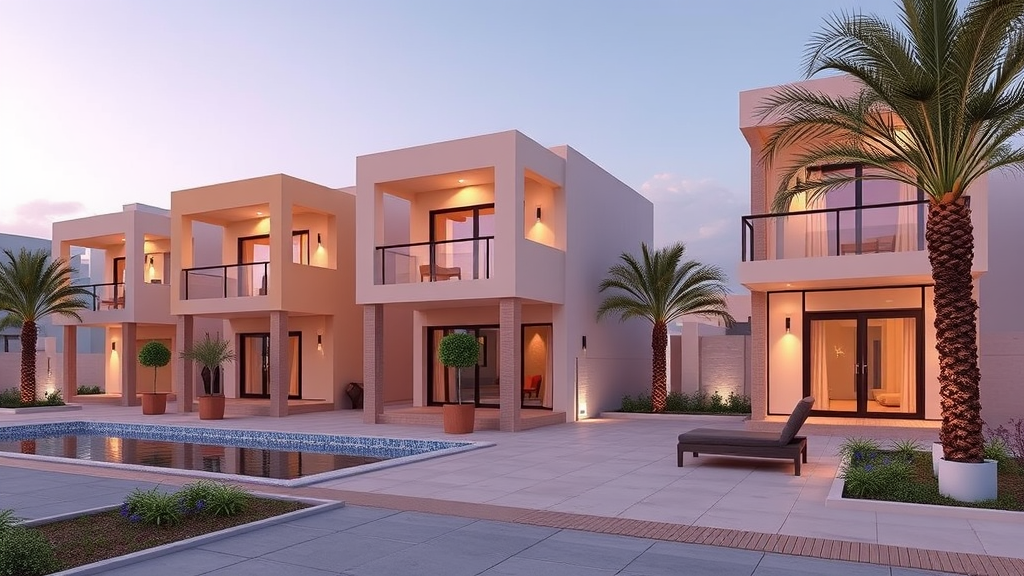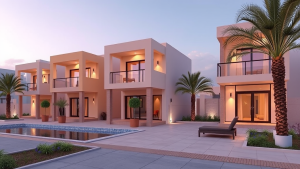The factors contributing to low utility bills in Hurghada despite global price increases
In recent years, the world has seen a significant rise in utility bills, but Hurghada, a stunning city on the Red Sea coast of Egypt, offers a different story. Residents and businesses in this beautiful coastal destination enjoy relatively low utility costs, despite the global trend of increasing prices. Let’s explore some key factors contributing to this phenomenon.
Stable energy supply
One of the foremost reasons why utility bills remain low in Hurghada is its stable energy supply. The Egyptian government has invested heavily in energy infrastructure, particularly in renewable sources like solar and wind power. This push towards sustainability has not only helped maintain energy prices but also provided a reliable power source for the city’s residents. With abundant sunlight throughout the year, solar energy plays a crucial role in keeping costs down.
Government subsidies
The Egyptian government offers various subsidies aimed at controlling utility prices for its citizens. These subsidies ensure that both electricity and water rates remain affordable even as global prices climb. Residents of Hurghada benefit directly from these initiatives, making it easier for families to manage their monthly expenses. By keeping utility costs in check, the government supports the local economy and promotes a better quality of life for all residents.
Efficient water management
Water management plays a crucial role in determining utility bills. Hurghada’s geographical location means it faces challenges regarding water availability; however, advances in desalination technology have enhanced water supply efficiency. The city’s investments in water recycling and desalination plants have helped provide adequate water supply to meet the growing demands without dramatically hiking prices. This technological edge allows Hurghada to deliver vital water services at a reasonable cost.
Low demand due to environmental features
Hurghada’s unique environmental features can also contribute to lower utility bills. The city’s year-round warm climate reduces the need for heating in winter, and many residents rely on natural ventilation instead of air conditioning for cooling. This low demand during certain months leads to less strain on the energy grid, ultimately resulting in lower utility rates for customers.
Promoting energy efficiency
Another interesting aspect is the community’s widespread embrace of energy-efficient practices. Many households have adopted renewable energy technologies and eco-friendly appliances to reduce consumption further. This engagement in conservation not only saves individuals money but helps stabilize prices across the grid. Residents are increasingly aware of their usage habits, driving a culture of sustainability that directly impacts their utility expenses.
Local economic conditions
The economic environment in Hurghada also plays a role in maintaining low utility costs. The city thrives on tourism, which provides substantial revenue for local services. This tourism revenue allows the government to allocate funds efficiently, reducing the burden on utility providers and subsequently lowering costs for residents. Lower operational costs for utility providers translate into affordable prices for users.
Technological advancements
Technological innovations can make a substantial difference in utility management. Upgraded infrastructure, such as smart meters and improved distribution networks, allows for better monitoring and control of energy usage, reducing waste and losses. These advancements directly contribute to cost savings, which ultimately benefit consumers with lower bills. Such technology ensures that the utility providers operate more efficiently and are better equipped to manage fluctuations in demand.
Community awareness and involvement
The locals’ involvement in community programs promoting energy conservation further contributes to lower utility bills. Workshops and educational programs help residents understand the importance of reducing consumption and using resources wisely. As a result, the community engages in initiatives that collectively reduce energy use, further impacting the economic dynamics surrounding utility pricing.
To sum up, the combination of renewable energy sources, government support, efficient water management, lower demand due to climate conditions, community engagement, local economic dynamics, and technological advancements work in unison to keep utility bills in Hurghada surprisingly low. While the rest of the world faces rising costs, Hurghada shines as an example of how strategic management and community involvement can make a significant difference. As residents of this lovely city enjoy affordable utility bills, they also lead the way in sustainable living practices that could inspire global efforts to address rising costs elsewhere.
Comparative analysis of utility costs: Hurghada vs. other global cities
Utility costs have a direct impact on residents’ daily lives and expenses, shaping how much people pay for services like electricity, water, and gas. Interestingly, Hurghada, a popular resort city on the Red Sea in Egypt, maintains utility bills that are notably lower compared to many cities around the world. This comparative analysis sheds light on the factors that contribute to this discrepancy.
When you look at global cities such as New York, London, and Sydney, the cost of utilities can be surprisingly high. The average utility bill in major metropolitan areas tends to be inflated due to various reasons:
- Higher Production Costs: In many developed countries, the cost associated with generating electricity and providing clean water is substantially higher. This can be attributed to infrastructure maintenance, operational costs, and regulations.
- Environmental Regulations: Stringent environmental laws often require power and water companies in places like Europe to invest heavily in eco-friendly technologies. While this is beneficial for the planet, it inevitably raises prices for consumers.
- Market Demand: In cities with high demand, such as Tokyo or San Francisco, competition for energy resources can drive prices up, particularly during seasonal peaks.
In contrast, Hurghada presents a unique case. Here are several factors explaining why utility bills remain low in this Egyptian city:
- Abundant Natural Resources: Egypt benefits from ample sunlight and wind, which are harnessed for energy production. The cost of utilizing these renewable resources is significantly lower compared to fossil fuels used elsewhere.
- Government Subsidies: The Egyptian government frequently subsidizes utility costs to provide financial relief to citizens and promote local tourism. This practice keeps prices manageable for residents and visitors alike.
- Lower Demand: As a smaller tourist city, Hurghada has a lower overall utility demand compared to giants like Los Angeles or Frankfurt. Less demand leads to more stable and often lower pricing.
To put the figures into perspective, let’s take a closer look at the average monthly utility bills:
- Hurghada: Approximately $30, which includes electricity, heating, cooling, water, and garbage collection.
- New York City: Ranges between $150 and $200.
- London: Typically around $140.
- Sydney: Comes to about $100.
Such comparisons illustrate the stark differences that can exist even within utility costs. Furthermore, the services offered are quite similar across these locations; residents in Hurghada enjoy many of the same essential services but at a fraction of the cost. As you draw your own conclusions, consider how lifestyle and living conditions substantially impact overall expenses.
Another aspect to assess is the influence of tourism on utility costs in Hurghada. Tourist influx can indeed skew usage rates; however, local regulations help manage and distribute supply. Consequently, residents do not face the same exorbitant costs as other cities that cater significantly to tourism, where utilities are priced higher due to transient demand.
It’s essential to mention how government initiatives focus on sustaining infrastructure in cities like Hurghada. Smart management helps lower costs and maintain service quality, ensuring that residents can enjoy both affordability and reliability. This is in stark contrast to places where aging infrastructure may lead to power outages or increased maintenance costs, ultimately hiking up utility bills.
Evaluating utility costs in Hurghada compared to other major cities gives an enlightening perspective on the interplay of location, population size, natural resources, and government policy. With a proactive approach to resource management and a focus on sustainability, Hurghada continues to offer its residents an attractive living environment with notably low utility bills.
The unique landscape of Hurghada offers residents and visitors a notable advantage when it comes to utility bills, especially in the face of soaring global prices. A combination of stable governmental pricing policies, abundant natural resources, and an emphasis on modern infrastructure allows the city to maintain lower utility costs. While other global cities grapple with fluctuating energy prices and increased costs of living, Hurghada’s commitment to affordable utilities stands out.
Comparatively, cities that depend heavily on imported energy or face infrastructural challenges often experience significant spikes in their utility expenses. In contrast, Hurghada benefits from its strategic location along the Red Sea, enabling easier access to renewable energy sources and efficient distribution systems. This has made it possible for the city not only to keep prices low but also to promote sustainability.
As the global landscape continues to evolve, residents in Hurghada can take comfort in knowing that their utility bills will likely remain manageable. The city’s proactive approach to energy management, combined with favorable economic conditions, positions it as an exemplary model for affordable living. Those considering relocation or investment in Hurghada can find assurance in the stability of utility costs, making it an attractive destination in an otherwise uncertain global economy. Emphasizing these strengths ensures that Hurghada remains a beacon of affordable living, inviting everyone to experience its charm without the burden of steep utility expenses.
Last offer – affordable 3 bedroom town house for sale in almamsha promenade Hurghada under 150k — sea view homes for russian investors
14% off – beachfront studio apartment for sale in al gouna Hurghada under 50k — stylish homes for polish winter escapers












